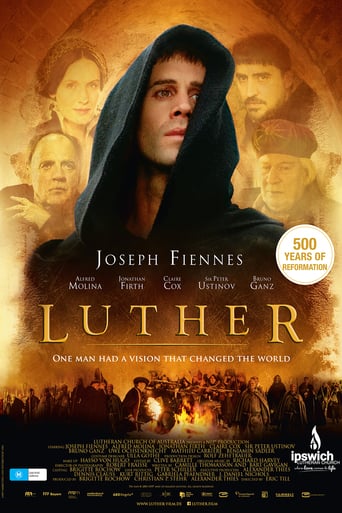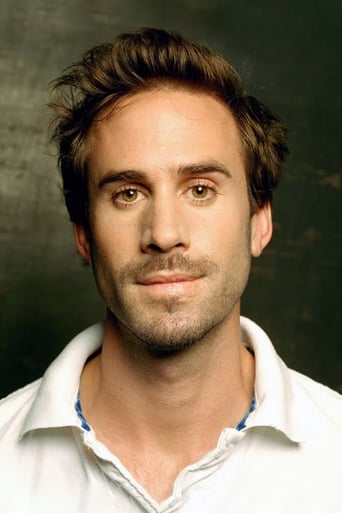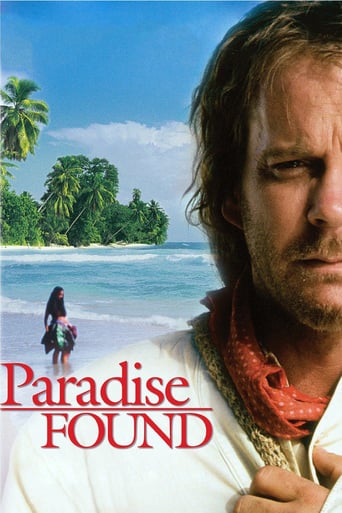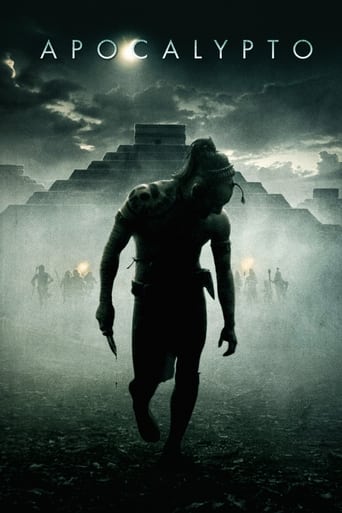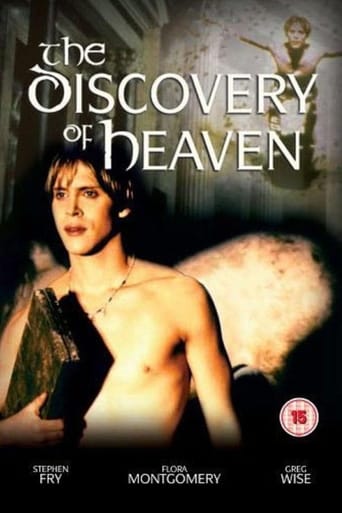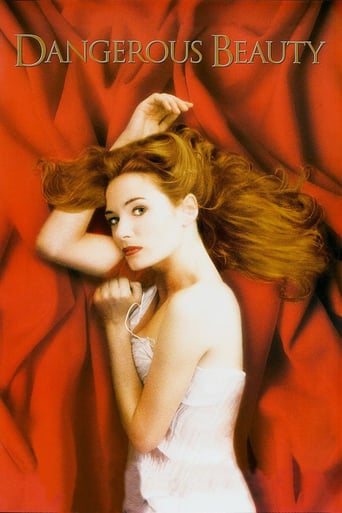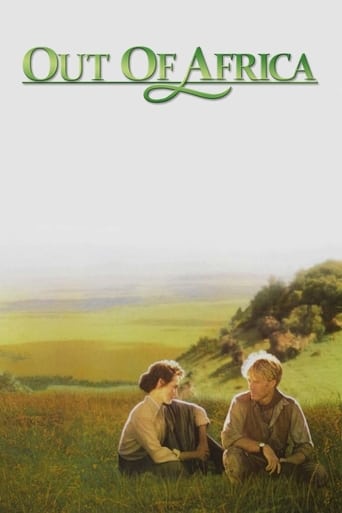Luther (2003)
During the early 16th century, idealistic German monk Martin Luther, disgusted by the materialism in the church, begins the dialogue that will lead to the Protestant Reformation.
Watch Trailer
Cast


Similar titles
Reviews
Very very predictable, including the post credit scene !!!
To me, this movie is perfection.
Good story, Not enough for a whole film
a film so unique, intoxicating and bizarre that it not only demands another viewing, but is also forgivable as a satirical comedy where the jokes eventually take the back seat.
This movie was produced by a LUTHERAN INSURANCE Company, I did not take this very well acted & well made Biography as being overly factual.It is excellent entertainment & will eventually be a staple item on the Biography Cable Television Channel.This was filmed in parts of Germany where these events probably took place, directed by Eric Till from a screenplay by Camille Thomasson & Bart Gavigan.The cast stars Joseph Fiennes as Luther with Alfred Molina as Tetzel & in his last movie Peter Ustinov,(He left us a few months after the film was made). The entire cast was very good, The film is in English,I wonder if it would have been better if they all spoke German.Hardly any biographies are overly accurate. There was a film in 1973 same title, with Stacy Keach as Luther & it was written by John Osborne a noted play-writer. From what I remember it was very DULL & even more DULL.This film is energetic & alive & not the least bit dull. As I said it is Biography Light.,.It did have short run in the US in 2003 & played in about 400 theatres.See this film as entertainment & not history, thats what I did & I liked it very much.Ratings ***1/2 (out of 4) 95 points (out of 100) IMDb 9 (out of 10) **Note: If you take this as religious history the ratings would be lower.
A film like this one is to be appreciated. Cinema should also effectively contribute to the culture of people. Many know that Luther existed but nothing more than that. This material gives an extract of the life of Martin Luther, role played well by Joseph Fiennes. In a state of discontent anywhere a rebel will reign easily, and it was clear that many priests in Germany were not glad at all with the dictatorship of Roman Church.Historically many things were just imposed by the Roman Church like the bible in Latin when a few people understood this dead language, the celibate of the priests, their privileges among the poor populations and many others. Luther understood well this situation and became a rebel and hero for church re vindication. Many Germans and Nordic nations embraced the ideas of Luther, and this led to the establishment of a new church (the Lutheran) with temples without icons and with new approach for serving God and the suffering people.The film was able in a short period of time to give a vision of all these problems. May be split in two parts of 120 minutes each would have been a good idea for making such a film.Peter Ustinov played well the role of Frederick The Wise. Certainly one enjoys looking at his performance in this material. The rest of the cast did also a very good performance.
Martin Luther was a rockstar. Now I won't pretend to be knowledgeable in theology or that I remember way back when to school years learning about the Reformation, so whether the ideas and words spoken in the film Luther are correct, I haven't a clue. However, either way I couldn't agree more with them. This is a man that never wanted a revolt; he never portrayed his views as an alternative to the Roman Catholic Church. No, he loved his religion and his God. The ideas and writings were in response to the tyranny of the Romans who usurped power as well as God's breath. The false idol of a Pope was beginning to create doctrines whether they meshed with scripture or not, as long as they were bringing money into the church. With the selling of indulgences to allow for the passage of deceased relatives into Heaven or to save your own soul from sins, we were given the biggest con ever. These people were peasants, unable to read the Bible for which they devoted their lives. They were duped into giving their savings to the church that wouldn't give them the decency of letting their own ideas and interpretations ferment. Luther saw this blasphemy and sought to rid the religion he held so dear of it. When asked to come before the Pope, he seriously thought he'd be able to prove his point and reform a broken system, instead he was given the truththe Pope wasn't interested in change, he was a proponent of the tyranny himself.It isn't that the idea of Catholocism is false; it is just that it is broken by the greed and business of humanity. God should speak to us without the need of a proxy. That middleman seems to only cause hatred and doubt for when one strays from the norm. Luther saw that everything bad about Catholicism was against the scripture of God himself. He could prove his words if only they had given him a chance. According to this film, Luther did not incite the Protestant Reformation, the Catholic Church did so themselves. If only they had listened and looked past the money and the power, they could have united their religion, as Luther wanted, instead they allowed him to be their enemy and gather strength. Sometimes that strength used his name in vain with words such as "learn to despise props and pretensions" as one man strips another of his crucifix, but it is that passion and misguided anger that erupts from a polarized event such as the attempt to prove Luther a heretic. We would not have religious freedom without the gumption and confidence of this theologian. Whether one agrees with what he did or not, you cannot deny him gratitude for that.Does Luther succeed as a piece of work? I must say yes; I couldn't have been made as passionate about the cause as I was without their being some success on the part of those involved. Nothing is really done spectacularly or jumps off the screen screaming genius; no this is a very straightforward and solid film. It does what it sets out to do and never tries to be flashy or inventive because that was not the purpose. The filmmakers set out to tell the tale of a man that is a hero to many, whether they align with his ideas or not. Had Luther not stood up to the Catholics, we in America may still be partaking in the Inquisition, burning friends of yours at the stake for being Lutheran, Methodist, Mormon, Muslin, etc. The beauty of freedom is that you don't have to agree, just agree to disagree. One can be passionate and outspoken, but you don't have to listen. You have the freedom to walk away, not the freedom to repress.As with the story and movie itself, the acting is quite solid too. Joseph Fiennes shows once again that he is the go-to guy for Shakespeare and period pieces, (has he ever done something else?). The moments when he wrestles with his inner demons are intense as are the quiet reflections as he tries to compose an argument in his head so that he can be true to his ideals, true to his faith and God, yet still go against the rules while attempting to keep his life. Of specific mention besides Fiennes would be Peter Ustinov, Jochen Horst, and Bruno Ganz. I'm not sure whether my praise is for Ustinov's performance or for the resilience of moral fortitude on the part of his character Frederick the Wise. He may not agree with the strong words of his professor Luther, but that doesn't excuse the fact that he should be allowed to continue to preach. When Ustinov breaks down after seeing the way the Papacy thought they could bribe him, I couldn't think of a more memorable scene. And when he is given the German translation of the Biblethe most fierce weapon imaginable for the Church as it allowed the commoner the ability to read God's words himselfyou can't help but smile at his absolute glee.Horst is great as a fellow professor in Wittenberg who at first questions this young unconfident monk. Soon though he buys into the rhetoric and becomes his staunchest supporter to the end of being a bit too overzealous. He takes the mantle of Luther to violence and revoltmaybe this was the obvious next step, but Luther would have never gone there himself. And of course there is Ganz. This guy is solid and never takes a wrong turn. As Luther's spiritual father, Ganz is the reason he is sent to teach and spread his ideas. He always wanted his pupil to change the world and rid Catholicism of its poison, however, he never saw the pain and suffering that change would lead to before the dust was to settle into harmony.
This movie is more fantasy than fact. The real Luther, was a crude, anti-Semite, who boinked his maid while married, and is responsible for the slaughter of thousands of peasants. While the Church was corrupt at this time, there was a Catholic reform/renewal movement taking place w/in the Church such as St. Thomas Moore, St. Theresa, the Jesuits, the Oratory, ext.,this movie portrays all Catholics as sinister, the Church as evil,and Luther as a great saint, rather than the deeply troubled, neurotic, sexually addicted,ego maniac he was. The acting was weak. This movie is promoted strongly in many Protesant churches, but needed more balance.

